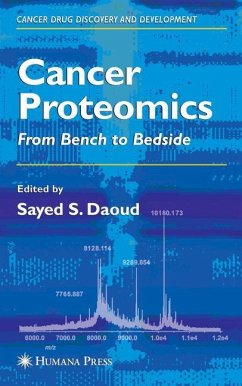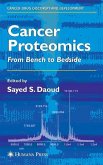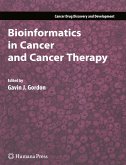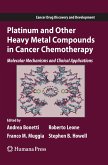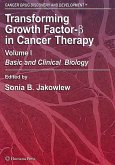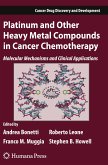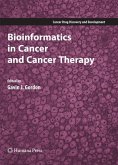This book provides the reader with broad perspectives and breadth of knowledge on current topics related to the use of proteomic strategies in cancer therapy as well as anticipated challenges that may arise from its application in daily practice. The book is divided into 4 parts. The first part begins with the current technologies used in proteomics that allow for protein profiling and for the identification of druggable targets in human samples. Mass spectrometry based protein characterization and protein microarrays hold great promise of predicting response to specific drugs in cancer therapy. The second part deals with the use proteomics in cell signaling. At the present, the pharmaceutical and biotechnology industries have many potentially useful small molecule inhibitors of many pathways important in cancer that have yet to be taken to clinical trials. Understanding protein-protein interaction and posttranslational modifications through proteomics will likely make it much more feasible to do effective clinical trials of these small molecules alone and in combinations to overcome drug resistance and improve patient care. The third part of the book moves from signaling to actual clinical applications of proteomics in cancer therapy. Case studies in may tumor types are provided to show the feasibility of generating the critical information needed to individualization of therapy in cancer patients. The final part of the book provides in depth information on annotating the human proteome and the role of Food and Drug Administration (FDA) in regulating the use of proteomics in cancer therapy. To functionally annotate the human proteome, the Swiss Institute for Bioinformatics (SIB) and the European Bioinformatics Institute (EBI) initiated a major effort to distribute to the scientific community highly integrated information on human protein sequences. This initiative, which is called the Human Proteomics Initiative (HPI) aims to provide for each known human proteina wealth of information that include the description of its function, domain and protein family classification, subcellular location, posttranslational modifications, variants and similarities to other proteins. Integration of bioinformatics into clinical application of proteomics in cancer therapy is outlined as well as regulations and policy of commercial application of proteomics in patient care.
Hinweis: Dieser Artikel kann nur an eine deutsche Lieferadresse ausgeliefert werden.
Hinweis: Dieser Artikel kann nur an eine deutsche Lieferadresse ausgeliefert werden.
From the reviews:
"This is a comprehensive overview of the current state of knowledge in the area of cancer proteomics ... . appropriate for cancer researchers of diverse specialties and clinicians conducting basic or clinical cancer research. ... a book that provides a truly comprehensive look at the utility of proteomics from 'bench to bedside.' All chapters are well referenced and of appropriate length, and many contain helpful illustrations. ... an excellent book that is appropriate for scientists and clinicians with an interest in cancer proteomics." (John D. Robertson, Doody's Review Service, May, 2008)
"This book ... provides the reader with a current perspective and anticipated uses of proteomic strategies in cancer therapy as well as basic cancer research. ... the book provides a broad account of the area of cancer proteomics and adequately covers issues relevant to the use of proteomic strategies in clinical research. ... The book would be of interest to clinicians and basic cancer researchers ... who are already involved in, or who are considering the use of proteomics in their work." (JF Timms, British Journal of Cancer, Vol. 99 (4), 2008)
"This is a comprehensive overview of the current state of knowledge in the area of cancer proteomics ... . appropriate for cancer researchers of diverse specialties and clinicians conducting basic or clinical cancer research. ... a book that provides a truly comprehensive look at the utility of proteomics from 'bench to bedside.' All chapters are well referenced and of appropriate length, and many contain helpful illustrations. ... an excellent book that is appropriate for scientists and clinicians with an interest in cancer proteomics." (John D. Robertson, Doody's Review Service, May, 2008)
"This book ... provides the reader with a current perspective and anticipated uses of proteomic strategies in cancer therapy as well as basic cancer research. ... the book provides a broad account of the area of cancer proteomics and adequately covers issues relevant to the use of proteomic strategies in clinical research. ... The book would be of interest to clinicians and basic cancer researchers ... who are already involved in, or who are considering the use of proteomics in their work." (JF Timms, British Journal of Cancer, Vol. 99 (4), 2008)

